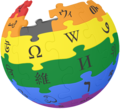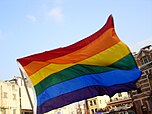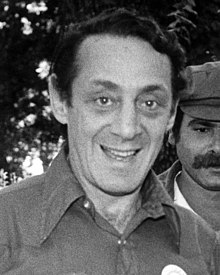| Main page | WikiProjects & Things you can do |

|
The LGBTQ+ Portal |

|

|

|
Introduction LGBTQ (also commonly seen as LGBT, LGBT+, LGBTQ+, and LGBTQIA+) is an initialism of lesbian, gay, bisexual, transgender and queer or questioning. It is an umbrella term, broadly referring to all sexualities, romantic orientations, and gender identities which are not heterosexual or cisgender. In the 1990s, gay, lesbian, and bisexual activists adopted the term LGB, supplanting narrower terms such as "gay or lesbian". Terminology eventually shifted to LGBT, as transgender people became more accepted within the movement. Around that time, some activists began to reclaim the term queer, seeing it as a more radical and inclusive umbrella term, though others reject it, due to its history as a pejorative. In recognition of this, the 2010s saw the adoption of LGBTQ, and other more inclusive variants. Some versions of the term, such as LGBT+ and LGBTQ+ add a plus sign, to represent additional identities not captured within the acronym. Many further variants exist which add additional identities, such as LGBTQIA+ (for intersex, asexual, aromantic, and agender) and 2SLGBTQ+ (for two-spirit), LGBTQQ (for queer and questioning), or which order the letters differently, as in GLBT and GLBTQ. The collective of all LGBTQ people is often called the LGBTQ community. These labels are not universally agreed upon by everyone that they are intended to include. For example, some intersex people prefer to be included in this grouping, while others do not. Various alternative umbrella terms exist across various cultures, including queer, same gender loving (SGL), Gender, Sexual and Romantic Minorities (GSRM). (Full article...) Selected article -The Compton's Cafeteria riot occurred in August 1966 in the Tenderloin district of San Francisco. The riot was a response to the violent and constant police harassment of trans people, particularly trans women, and drag queens. The incident was one of the first LGBTQ-related riots in United States history, preceding the more famous 1969 Stonewall riots in New York City. It marked the beginning of transgender activism in San Francisco. The 1960s was a pivotal period for sexual, gender, and ethnic minorities, as social movements championing civil rights and sexual liberation came to fruition. Additionally, the 1950s created the foundation for the trans rights and gay liberation movements with the earlier Homophile movement. Though Stonewall is often heralded as the beginning of the trans rights movement, the importance of Compton's Cafeteria Riots and the homophile movement that came first. Social groups helped mobilize and even churches, like Glide Memorial Methodist Church in San Francisco, began reaching out to the transgender community. Nevertheless, many police officers resisted these movements and the increasing visibility of these groups, continuing to harass and abuse transgender people. This simultaneous rise in support for transgender rights on the one side and the unwillingness to accept these new ideas on the other created the strain that fueled the riot at Compton's Cafeteria in the summer of 1966. The incident began when a transgender woman resisted arrest by throwing coffee at a police officer. It was followed by drag queens and transgender women pouring into the streets, fighting back with their high heels and heavy bags. (Full article...) Selected biography -Harvey Bernard Milk (May 22, 1930 – November 27, 1978) was an American politician and the first openly gay man to be elected to public office in California, as a member of the San Francisco Board of Supervisors. Milk was born and raised in New York. He acknowledged his homosexuality in adolescence but secretly pursued sexual relationships well into adulthood. The counterculture of the 1960s caused him to shed many of his conservative views about individual freedom and sexual expression. Milk moved to San Francisco in 1972 and opened a camera store. Although he held an assortment of jobs and frequently changed addresses, he settled in the Castro, a neighborhood that was experiencing a mass immigration of gay men and lesbians. He ran for city supervisor in 1973 but the existing gay political establishment resisted him. Milk's campaign was compared to theater due to his personality, earning media attention and votes, although not enough to be elected. He campaigned again in the next two supervisor elections, dubbing himself the "Mayor of Castro Street". The voter response caused him to also run for the California State Assembly. Due to his growing popularity, he led the gay rights movement in battles against anti-gay initiatives. Milk was elected city supervisor in 1977 after San Francisco began to choose neighborhood representatives rather than city-wide ones. During Milk's almost eleven months in office, he sponsored a bill banning discrimination based on sexual orientation in public accommodations, housing, and employment. The Supervisors passed the bill by a vote of 11–1, and Mayor George Moscone signed it into law. On November 27, 1978, Milk and Moscone were assassinated by Dan White, a disgruntled former city supervisor who cast the sole vote against Milk's bill. (Full article...) Selected quote -
Current events
Selected image - The Warren Cup, a Roman skyphos (drinking cup) featuring two representations of homoerotic sexual acts. It was most likely commissioned from Greek craftsmen between 1–20 CE.
Did you know… -
This month's birthdays
Selected listsRelated portalsFeatured contentThe following articles and lists have been identified as some of the best produced by the Wikipedia community:
TopicsCategoriesAssociated WikimediaThe following Wikimedia Foundation sister projects provide more on this subject:
Discover Wikipedia using portals |
























